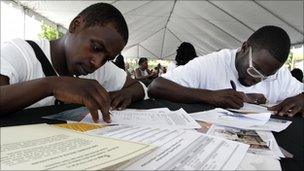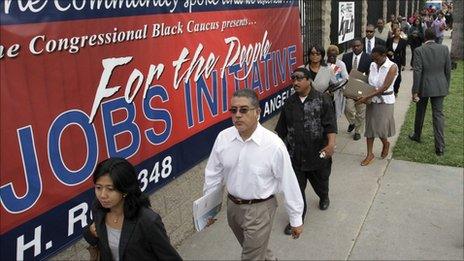Success for a Chicago school in a poor neighbourhood
- Published
- comments
Tim King says that schools like his are critical if African Americans are to break out of troubled inner cities
The young men, smart in their uniform of khaki trousers, dark blazer and red ties, are hurrying to their next class. Teachers here hope they are leading a charge, out of the ghetto and into good jobs.
This is Urban Prep, external, a charter school in inner-city Chicago, which revels in its nickname: "Hogwarts in the Hood". It's deliberately modelled on an English public school.
This oasis of learning is in blighted Englewood, one of Chicago's toughest and poorest areas.
All the pupils are boys, and all are black.
At a time when black unemployment in the states is higher than it has been for 27 years, external, the area could do with a success story.
The most recent figures, out yesterday, show black unemployment at 16%, twice the white rate, external.
Successful cliches
Some of the problems in this area are of long standing: crime, family break-down and drugs.
If these are cliches, so is this solution. It has often been said that one of the keys to breaking the cycle of African-American poverty is education.

Urban Prep boasts an impressive college placement rate for students who graduate from the programme
Like many cliches it is true.
"We've been incredibly successful," the founder and president of Urban Prep, Tim King, external, tells me. "All our students are African-American, about 85% are low income and 100% of our classes have gone on to college."
In 2010 and 2011, 100% of students who graduated from Urban Prep were accepted to college.
"It's extraordinary when you think about it because the number of African-Americans who go on to college in our country, the numbers are really low."
Another cliche is that the only way out for some kids is to become a rapper or a sports star.
Mr King says he wants to create role models who are engineers and scientists. Even getting a college degree makes a big difference.
"Education is key. It can become trite when you hear it, but it is really true," he says.
"Look at the numbers. Someone with a college degree is only going to suffer unemployment at 5%, while someone who is a high-school dropout is three times that much."
He thinks the school can have cross-generational impacts.
"It's a ripple effect. We think if we change one life, we will change their family's life, and their family's life will change their community.
"Our [students] here, their families value education, but [they] have not gone to college. But you know what? Their future families will go to college."
Public sector pain
It was rather a relief visiting Urban Prep, to hear optimism and hope.
Because my visit to Chicago led me on the whole to the rather depressing conclusion: that in these hard times there are few ways out of a downward spiral.
I visited the job centre that Michael Rivers, whose story I told on Thursday, has been going to every week for four years.
Howard Ray, Chicago cop and boxing trainer: "I see the anger, I see the frustration... they have no hope anymore"
The director of the centre, Andre Kellum, sets out clearly why he believes the black unemployment rate is the worst it has been for nearly 30 years.
First there are the long-term factors.
For obvious historical reasons, from slavery to segregation, black men traditionally got manual jobs at the bottom of the pile, jobs that needed no education.
Many of those jobs have now disappeared. He says those that remain need qualifications.
"Individuals who used to go to work as a janitor didn't used to have a high school diploma."
Now being a janitor requires that diploma.
"Just to push a bucket in a building because of legislations and laws," Mr Kellum says.
"If you are mopping a floor, you have to know how to measure those chemicals. If you do that the wrong way, you could put someone in the hospital."
"By not having those skill sets, not having to have them in the past, impacts the community."

Job seekers fill out forms at a job fair sponsored by the Congressional Black Caucus.
But perhaps the biggest impact is something that is still going on. Something that there is great enthusiasm for in Washington.
Deeper, sharper cuts in government spending, at state and federal levels.
A higher proportion of African-Americans work for the public sector (20.9%, compared to 4.1% for whites).
Friday's figures show more than 65,000 such jobs were lost last month.
"When the government starts cutting back guess who becomes unemployed?" Mr Kellum said.
"A lot of African-Americans who fill positions like administering the benefits, the clerks, people who answer the phones, the traffic-ticket agents, the individuals who were the guest greeters, those were the sort of positions African-Americans had."
'The president is not God'
Robert Blackwell believes more enterprise is the answer.
He's part of President Obama's set, a good friend and a fundraiser.
Indeed, he once employed Mr Obama. Although he's the same age as the president, with the same cool good looks, he could be Mr Obama's younger brother.
He is one of Chicago's wealthy black professionals, who made his money out of a ping pong business, external before branching out into management consultancy.
He says the public sector cuts have hit hard.
"There's no business that can absorb that community. Black companies are pretty small and neither government nor large corporations have a very good track record frankly doing business with blacks."
"Therefore, there's nowhere for these people to go who come off the public sector roles."
But Mr Blackwell says the challenge is really one of entrepreneurship.
"If blacks were to participate in proportion to their skill and population, we would have a lot more dollars in our community," he says.
"We could hire people, we could take more risk. There'd be social capital. I think entrepreneurship is really the only way out. "
While he has raised money for Mr Obama, he doesn't seem like a fan of the president's policies.
He says he's a libertarian: he doesn't think the government can create jobs and wants less red tape.
But he doesn't blame the president.
"Barack didn't start this. I mean the economy was not in good shape when he came in," Mr Blackwell says.
"The other thing I think is the president is not God, which means he can't control everything. If you believe in free enterprise, which I do, he has a limited role."
"So he doesn't create jobs, it's the private sector that creates jobs."
Few here do blame the president.
If they express a political view, it is that Congress is blocking Mr Obama's policies: exactly the line the White House is pushing at the moment.
But it remains a depressing fact that under the first black president, black people's economic prospects have only got worse.
- Published7 October 2011

- Published7 October 2011
- Published10 December 2010